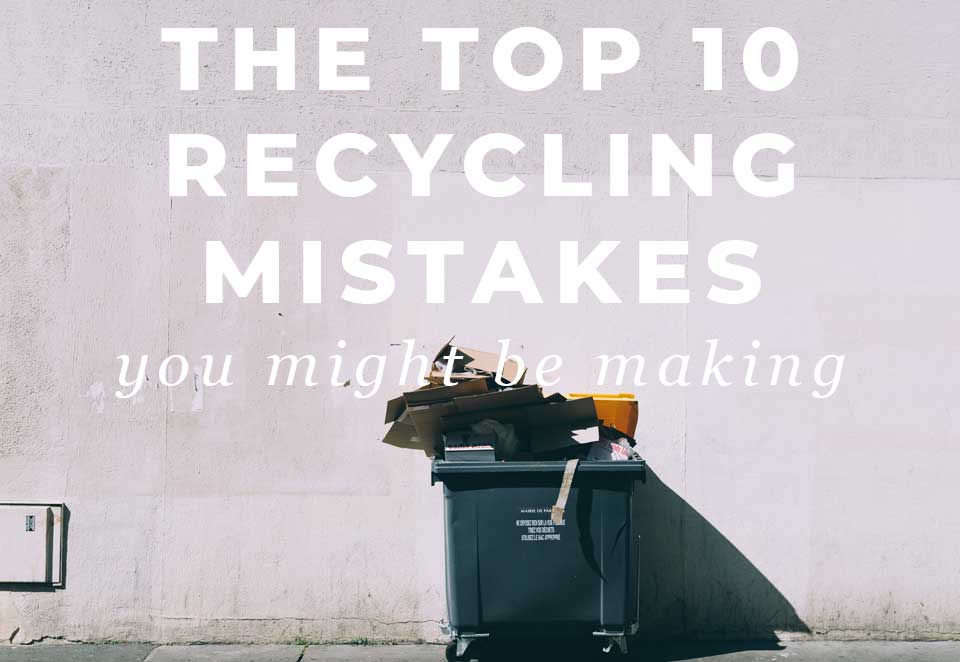Living with less and making do with what you have might be kind of overwhelming to think about if you’re just starting down the path of a more eco-friendly lifestyle. Recycling is a great first step if you’re keen on being more conscious of your impact on the earth. But, did you know that if you recycle wrong you can actually do a lot more harm than good?
Have you ever tossed something in the blue bin that seems like it should be recyclable but you aren’t 100% sure? You might be thinking, “it’s better to send this item to a recycling facility where it might be recycled or composted instead of directly to the landfill.” We call this wishful recycling.
Wishful recycling is often done by people who mean well but it can have a hugely negative impact far beyond just your own discards. Incorrectly placing an item in with your recycling could potentially contaminate your whole bin, and even the entire truckload of recyclables—sending it all straight to the landfill. Recycling contamination can also break recycling machinery, slow down operations, and create unsafe work conditions (especially when sharp or hazardous materials are improperly discarded). The precautions helped to coin the phrase “when in doubt, throw it out.”

If an eco-friendly lifestyle is important to you, you probably try to recycle everything you discard. If your weekly garbage bin is minimal but your recycling bin is overflowing, you’ve likely made some small changes that have amounted to a big difference over time—and that’s great! The next time you’re sorting your trash, reference this list to make sure all of your efforts are having the positive impact you expect and to stop wishful recycling by avoiding these 10 common offenders:
Plastic bags—these can clog machines and bring recycling centers to a halt. Get in the habit of bringing reusable bags on your shopping trips. If you have plastic bags at home, many grocery stores offer a bin at the entrance specifically for disposing of these single-use bags.
Pizza boxes—the grease makes this cardboard unrecyclable. If a container has food stains, it doesn’t belong with the recycling. The good news? Cardboard boxes can be composted as can other food-soiled paper, so long as they’re not lined with plastic.
Wrapping paper—along with any shiny gift wrap, decorative ribbons, and cards with glitter (which can contaminate an entire bin of recycling). When giving a gift, look for unlaminated paper like newspaper, paper bags or butcher paper which can all safely be tossed in the recycling bin when you’re finished.
Small metal bits—Pieces of small metal like soda can tabs and aluminum candy wrappers are technically recyclable, their small size makes them hard to detect and they often jam recycling machinery. Keep soda tabs attached to the can and combine metal wrappers to make a large ball before placing in the bin.
Thermal receipt paper—these contain Bisphenol A (BPA) and is full of chemicals. When recycled, these contaminate the recycled paper products that are being processed. When possible, opt for no receipt when shopping.
Broken dishes—Discarded or broken plates, ceramics, porcelain, mirrors, light bulbs, cups, wine glasses and pyrex have different melting points and chemical compositions compared to recyclable glass and belong in the trash. If you have usable, but no longer wanted dishes, donate these to people or organizations who can get more use out of them.
Diapers/sanitary napkins—Even if you’re discarding these clean and unused for some reason, these belong in the trash. If you’ve opted for compostable diapers, know that most municipalities still won’t accept these. In the future, consider reusable cloth diapers and reusable pads or a menstrual cup.
Shredded paper—Surprisingly small bits of paper are not recyclable because they can get caught in equipment or literally fall through the cracks. However, shredded paper can be easily composted.
Disposable coffee cups—The plastic lining that prevents leaks unfortunately also prevents them from being recyclable. Plastic lids may be recyclable depending on what is accepted at your local municipality, and the paper sleeve that protects you from heat is likely able to be recycled. A better option? Opt for a reusable cup and ditch the single-use items altogether.
Paperboard boxes—Products that are destined for the freezer often contain a plastic polymer that prevents freezer burn that also prevents the box from breaking down in the recycling process.
If some of these items are surprising to you they’ll probably be surprising to others, too. Share this list with a friend to amplify your earth-saving intentions and bring proper awareness to sort our discards appropriately. And if filling up your trash bin can feel a little painful, seek out some new alternatives with packaging that’s made to be recycled so we can show brands this is something important to us (and to our earth as a whole).















